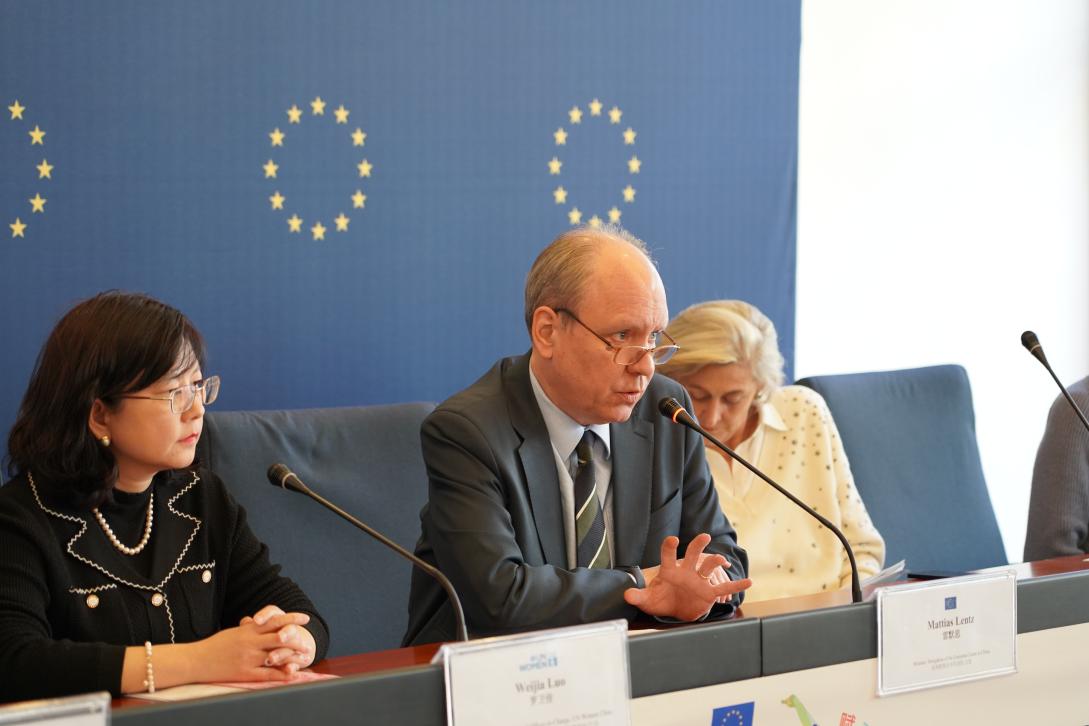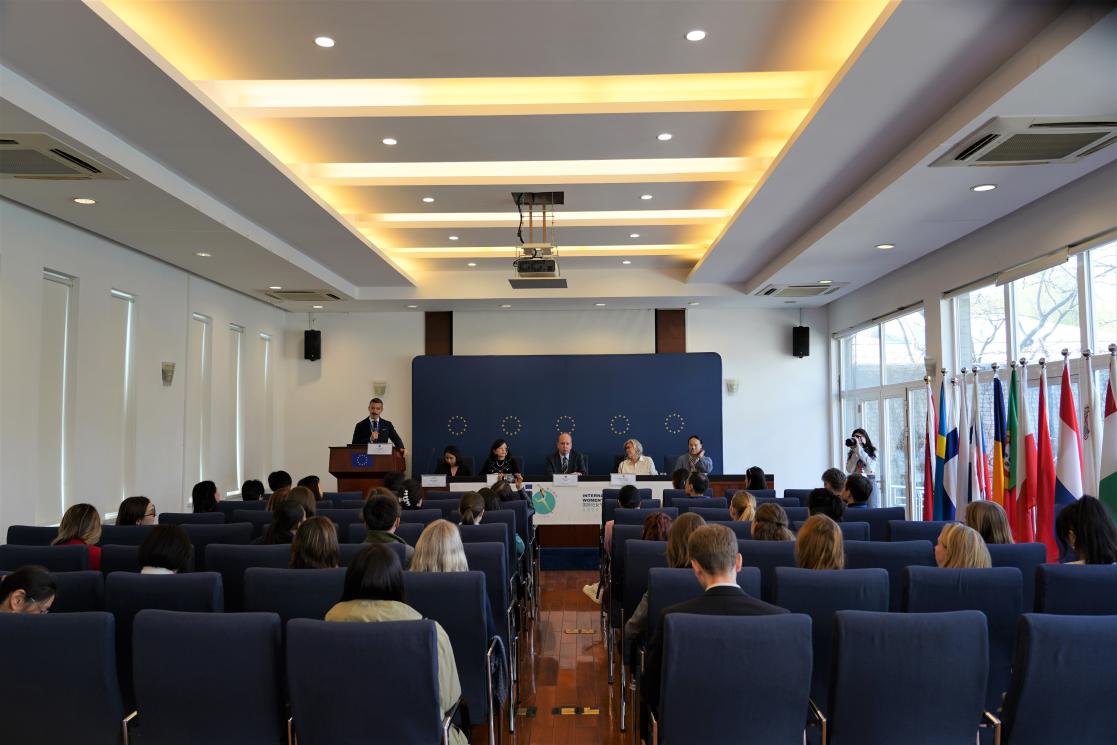Deputy Head of Delegation to China’s speech at “Benefits of Women’s Empowerment to the Economy and the Environment” seminar

Ambassador of Spain to China Ms Marta Betanzos, UN Women partners,
Ladies and gentlemen, distinguished guests, colleagues,
Good afternoon,
Today, as we stand at the crossroads of unprecedented global challenges and opportunities, it's both a privilege and a responsibility to discuss the transformative power of gender equality and women's empowerment.
For the European Union, the pursuit of gender equality is not just a moral or social obligation; it is a strategic imperative that lies at the heart of sustainable economic and social development. Women and girls, in all their diversity, are key agents of change, innovation, and resilience. Their empowerment is vital for the creation of fair, inclusive, prosperous, and peaceful societies worldwide. This belief is not only embedded in our internal policies, but also guides our external actions and partnerships, including our strategic partnership with China.
As we navigate through the complexities of the 21st century, from climate change to digital transformation, the empowerment of women and girls stands as a beacon of hope and a catalyst for global prosperity and environmental stewardship.
The European Union has long recognized the interconnections between gender equality, economic prosperity, and environmental sustainability. Through comprehensive policies and strategic actions, the EU aims to integrate gender considerations into all aspects of its external relations, development cooperation, and environmental policies.
Central to these efforts are the EU Gender Equality Strategy 2020-2025 and the EU Gender Action Plan III (GAP III), which outline the EU’s commitment to advancing gender equality within the Union and in its relations with external partners.
The economic benefits of women's empowerment are profound and multifaceted, impacting not only the lives of women themselves but also the broader economic fabric of societies and nations at large.
Research consistently shows that when more women enter the workforce, gross domestic product (GDP) grows, poverty rates decline, and economies become more resilient to economic shocks.
Diverse teams, including gender-diverse ones, have been shown to be more innovative and better at problem-solving. When women are given equal opportunities to contribute and lead, businesses and economies benefit from a broader range of insights, ideas, and competencies, driving competitive advantage.
By promoting policies that ensure women's participation in the economy, support female entrepreneurship, and address the gender pay gap, the EU aims to enhance economic inclusiveness and sustainability.
Women's economic empowerment is crucial for achieving sustainable development goals (SDGs), particularly those related to poverty reduction, health, education, and economic equality. The EU's commitment to gender equality in its external action, including through trade policy, signifies its role in creating an enabling environment for women's economic participation globally.
The environmental benefits of women's empowerment are integral to achieving a sustainable and equitable green transition. Women bring unique perspectives and solutions to environmental conservation and climate action. Recognizing these contributions is crucial for the success of global sustainability efforts, including those outlined in the European Union's Green Deal.
Women often possess a profound knowledge of biodiversity and natural resource management, particularly in rural and indigenous communities where they are primarily responsible for food production and water collection. This knowledge is invaluable for creating sustainable agricultural practices, conserving biodiversity, and managing natural resources effectively.
Furthermore, women's leadership in environmental and climate initiatives has been shown to result in more effective solutions. When women are involved in decision-making processes, policies and projects are more likely to be inclusive, equitable, and successful in the long term.
The European Union's Green Deal represents a comprehensive plan to make the EU's economy sustainable by turning climate and environmental challenges into opportunities across all policy areas.
The EU has acknowledged the importance of including gender considerations in its environmental policies. By ensuring that policies account for gender differences, the EU aims to enhance the effectiveness of its climate actions and ensure that benefits are equitably distributed among men and women. This approach not only advances gender equality but also strengthens the overall impact of the Green Deal.
The EU’s gender-focused policies have already shown tangible impacts across various sectors and regions, as demonstrated through numerous examples:
- Through its support for female entrepreneurship and women’s participation in the workforce, the EU has contributed to enhancing women's economic rights and opportunities.
- In countries like Kenya and Mozambique, the EU has supported projects that aim to reduce the digital divide and promote skills development for women and girls in male-dominated sectors, including those related to environmental sustainability.
- The EU’s emphasis on including gender as a substantive component of trade negotiations has been instrumental in ensuring that women benefit equally from trade agreements
Allow me to highlight our global and long-term partnership with UN Women, which I thank also for participating in this seminar here today. The strategic partnership between the EU and UN Women has been critical in advancing gender equality and women’s rights at all levels. Over the past decade, this partnership has focused on eliminating conflict-related sexual violence, empowering women through education, and ensuring their participation in public life. In China, the EU finances projects executed by UN Women, such as Women in Motion, also represented here today to showcase the impact of the project.
The EU works along with the EU Member States on gender issues. Here in China, we coordinate activities, such as the Empower Her March campaign through the month of March, to promote gender equality and inspire women’s empowerment.
The European Union's commitment to gender equality and women's empowerment exemplifies a comprehensive and strategic approach to fostering a more equitable world.
The journey towards gender equality is ongoing, and the European Union is proud to be at the forefront of this transformative endeavour. Together, with partners around the world, we will continue to strive for a world where every woman and girl can realize her full potential, contributing to a brighter, more equitable and more sustainable future for all.

EU, 2024
